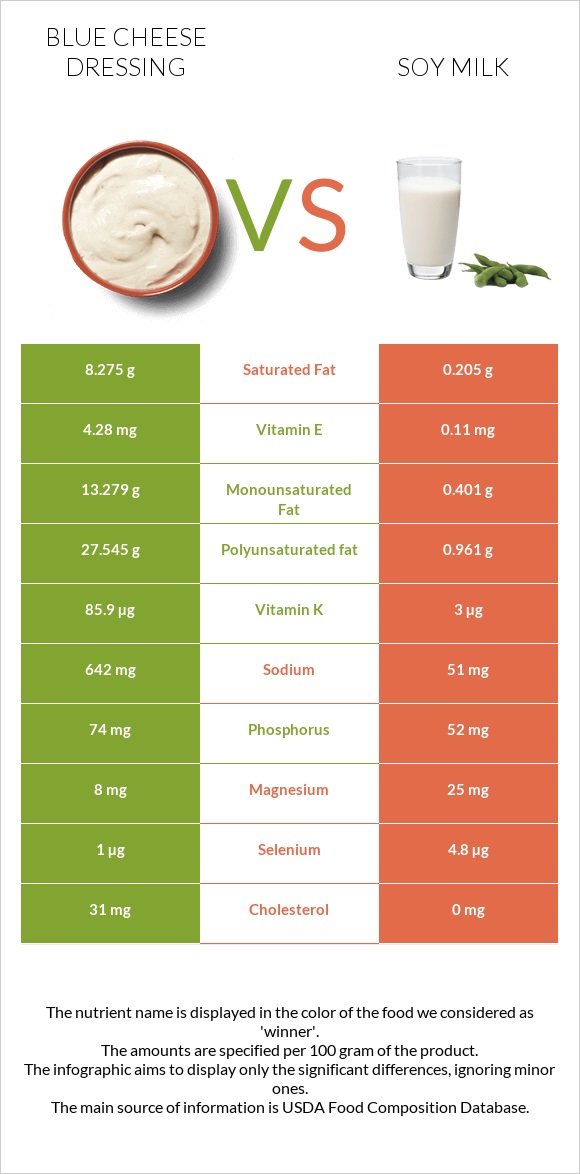Blue cheese dressing vs. Soy milk — In-Depth Nutrition Comparison
Compare
How are blue cheese dressing and soy milk different?
- Blue cheese dressing is higher in vitamin K, vitamin E, and vitamin B12; however, soy milk is richer in copper, manganese, selenium, and iron.
- Daily need coverage for vitamin K for blue cheese dressing is 69% higher.
- Soy milk has less cholesterol.
Salad dressing, blue or roquefort cheese dressing, commercial, regular and Soymilk, original, and vanilla, unfortified are the varieties used in this article.
Infographic

Infographic link
Mineral Comparison
Mineral comparison score is based on the number of minerals by which one or the other food is richer. The "coverage" charts below show how much of the daily needs can be covered by 300 grams of the food.
| Contains more CalciumCalcium | +48% |
| Contains more ZincZinc | +75% |
| Contains more PhosphorusPhosphorus | +42.3% |
| Contains more MagnesiumMagnesium | +212.5% |
| Contains more PotassiumPotassium | +34.1% |
| Contains more IronIron | +611.1% |
| Contains more CopperCopper | +1322.2% |
| Contains less SodiumSodium | -92.1% |
| Contains more ManganeseManganese | +3616.7% |
| Contains more SeleniumSelenium | +380% |
Vitamin Comparison
Vitamin comparison score is based on the number of vitamins by which one or the other food is richer. The "coverage" charts below show how much of the daily needs can be covered by 300 grams of the food.
| Contains more Vitamin CVitamin C | +∞% |
| Contains more Vitamin AVitamin A | +∞% |
| Contains more Vitamin EVitamin E | +3790.9% |
| Contains more Vitamin DVitamin D | +∞% |
| Contains more Vitamin B2Vitamin B2 | +44.9% |
| Contains more Vitamin B12Vitamin B12 | +∞% |
| Contains more Vitamin KVitamin K | +2763.3% |
| Contains more Vitamin B1Vitamin B1 | +500% |
| Contains more Vitamin B3Vitamin B3 | +413% |
| Contains more Vitamin B6Vitamin B6 | +108.1% |
| Contains more FolateFolate | +260% |
All nutrients comparison - raw data values
| Nutrient |  |
 |
DV% diff. |
| Polyunsaturated fat | 27.545g | 0.961g | 177% |
| Fats | 51.1g | 1.75g | 76% |
| Vitamin K | 85.9µg | 3µg | 69% |
| Saturated fat | 8.275g | 0.205g | 37% |
| Monounsaturated fat | 13.279g | 0.401g | 32% |
| Vitamin E | 4.28mg | 0.11mg | 28% |
| Sodium | 642mg | 51mg | 26% |
| Calories | 484kcal | 54kcal | 22% |
| Copper | 0.009mg | 0.128mg | 13% |
| Vitamin B12 | 0.27µg | 0µg | 11% |
| Cholesterol | 31mg | 0mg | 10% |
| Manganese | 0.006mg | 0.223mg | 9% |
| Iron | 0.09mg | 0.64mg | 7% |
| Selenium | 1µg | 4.8µg | 7% |
| Protein | 1.37g | 3.27g | 4% |
| Magnesium | 8mg | 25mg | 4% |
| Vitamin B1 | 0.01mg | 0.06mg | 4% |
| Phosphorus | 74mg | 52mg | 3% |
| Vitamin B3 | 0.1mg | 0.513mg | 3% |
| Vitamin B6 | 0.037mg | 0.077mg | 3% |
| Folate | 5µg | 18µg | 3% |
| Vitamin A | 14µg | 0µg | 2% |
| Vitamin B2 | 0.1mg | 0.069mg | 2% |
| Vitamin C | 0.7mg | 0mg | 1% |
| Carbs | 4.77g | 6.28g | 1% |
| Calcium | 37mg | 25mg | 1% |
| Potassium | 88mg | 118mg | 1% |
| Fiber | 0.4g | 0.6g | 1% |
| Zinc | 0.21mg | 0.12mg | 1% |
| Vitamin D | 0.1µg | 0µg | 1% |
| Choline | 17.9mg | 23.6mg | 1% |
| Net carbs | 4.37g | 5.68g | N/A |
| Vitamin D | 3 IU | 0 IU | 0% |
| Sugar | 3.48g | 3.99g | N/A |
| Vitamin B5 | 0.388mg | 0.373mg | 0% |
| Trans fat | 1.34g | 0g | N/A |
| Tryptophan | 0.038mg | 0% | |
| Threonine | 0.108mg | 0% | |
| Isoleucine | 0.114mg | 0% | |
| Leucine | 0.186mg | 0% | |
| Lysine | 0.131mg | 0% | |
| Methionine | 0.027mg | 0% | |
| Phenylalanine | 0.113mg | 0% | |
| Valine | 0.117mg | 0% | |
| Histidine | 0.061mg | 0% | |
| Omega-3 - DHA | 0.003g | 0g | N/A |
Macronutrient Comparison
Macronutrient breakdown side-by-side comparison
Protein:
1.37 g
Fats:
51.1 g
Carbs:
4.77 g
Water:
39.71 g
Other:
3.05 g
Protein:
3.27 g
Fats:
1.75 g
Carbs:
6.28 g
Water:
88.05 g
Other:
0.65 g
| Contains more FatsFats | +2820% |
| Contains more OtherOther | +369.2% |
| Contains more ProteinProtein | +138.7% |
| Contains more CarbsCarbs | +31.7% |
| Contains more WaterWater | +121.7% |
Fat Type Comparison
Fat type breakdown side-by-side comparison
Saturated fat:
Sat. Fat
8.275 g
Monounsaturated fat:
Mono. Fat
13.279 g
Polyunsaturated fat:
Poly. Fat
27.545 g
Saturated fat:
Sat. Fat
0.205 g
Monounsaturated fat:
Mono. Fat
0.401 g
Polyunsaturated fat:
Poly. Fat
0.961 g
| Contains more Mono. FatMonounsaturated fat | +3211.5% |
| Contains more Poly. FatPolyunsaturated fat | +2766.3% |
| Contains less Sat. FatSaturated fat | -97.5% |





